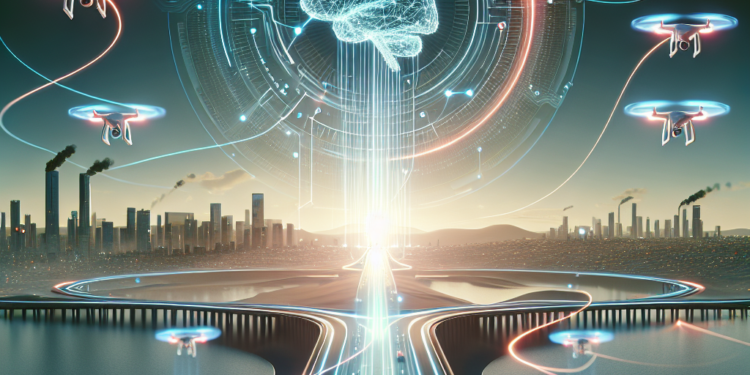Artificial intelligence (AI) has revolutionized numerous industries, and one of the most exciting applications is its role in autonomous drones. Drones have become an increasingly popular tool for a wide range of applications, from aerial photography and videography to search and rescue missions and agricultural monitoring. With advancements in AI technology, drones are now capable of operating independently, without human intervention, opening up a world of possibilities for their use.
One of the key benefits of AI in autonomous drones is the ability to make decisions in real time based on the information gathered by sensors on the drone. This allows drones to navigate complex environments, avoid obstacles, and adapt to changing conditions without human input. For example, AI algorithms can analyze data from cameras and other sensors to detect and avoid obstacles in the drone’s path, such as buildings, trees, or other drones. This capability is crucial for safe and efficient drone operations, particularly in urban areas or other challenging environments.
Another important aspect of AI in autonomous drones is the ability to optimize flight paths and mission plans based on the specific goals of the mission. For example, drones can be programmed to follow specific routes, survey a designated area, or track a moving target using AI algorithms that optimize the trajectory and speed of the drone to achieve the desired outcome. This level of autonomy allows drones to perform complex tasks with precision and efficiency, saving time and resources compared to manual operation.
AI technology also enables drones to learn from their experiences and improve their performance over time. By analyzing data collected during flights, AI algorithms can identify patterns and trends that help drones make better decisions in the future. For example, drones can learn to predict how certain environmental conditions will affect their flight performance and adjust their behavior accordingly. This process of machine learning allows drones to continuously improve their capabilities and adapt to new challenges, making them more reliable and effective for a wide range of applications.
One of the most promising applications of AI in autonomous drones is in the field of autonomous delivery. Companies like Amazon and UPS are already exploring the use of drones for delivering packages to customers, and AI technology is key to making these operations safe, efficient, and scalable. By using AI algorithms to plan optimal delivery routes, avoid obstacles, and ensure accurate drop-offs, drones can revolutionize the delivery industry by providing faster and more convenient service to customers.
In addition to delivery services, AI-powered drones are being used for a variety of other applications, such as monitoring and surveillance, mapping and surveying, and disaster response. For example, drones equipped with AI algorithms can be used to monitor wildlife populations, track the spread of diseases, or assess the damage caused by natural disasters. These capabilities are particularly valuable in situations where human access is limited or dangerous, allowing drones to collect data and perform tasks that would otherwise be impossible.
Despite the numerous benefits of AI in autonomous drones, there are also challenges and limitations that must be addressed. One of the main concerns is the potential for AI algorithms to make mistakes or misinterpret data, leading to accidents or incorrect decisions. To mitigate this risk, developers must design robust AI systems that are capable of handling unexpected situations and errors effectively. Additionally, there are ethical and privacy considerations related to the use of drones, particularly in areas such as surveillance and security. It is essential to establish clear guidelines and regulations to ensure that drones are used responsibly and ethically.
Overall, AI technology is transforming the capabilities of autonomous drones and opening up new possibilities for their use in a variety of industries. With the ability to make decisions in real time, optimize flight paths, learn from experience, and adapt to changing conditions, drones equipped with AI algorithms are becoming powerful tools for a wide range of applications. As technology continues to advance, we can expect to see even more innovative uses for autonomous drones, further revolutionizing industries and improving the way we work and live.













